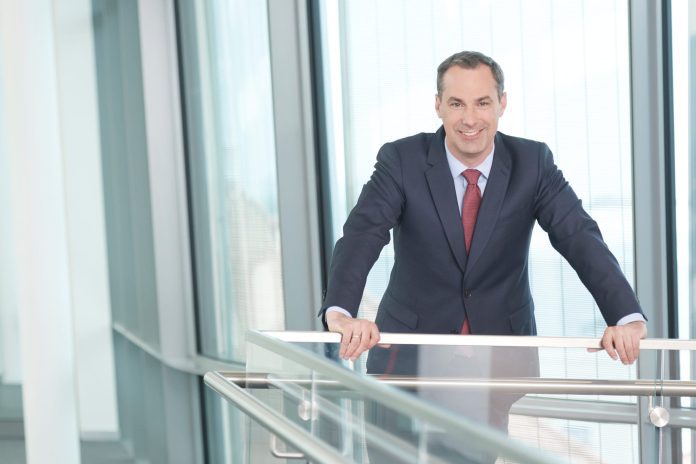German industrial giant Siemens has called for the planet to urgently prioritise digital technologies, of the type it is selling, in order to meet environmental and societal challenges, and to equip the economy with the working tools to better cope in mass-crisis scenarios, such as it is living through now with the coronavirus (Covid-19) pandemic.
Cedrik Neike, chief executive of the company’s Smart Infrastructure division, said: “We have a golden opportunity to reassess how technology can be applied to tackle the challenges of climate change, urbanisation and population growth. The pandemic is creating a paradigm shift: we are on the cusp of a leapfrog into a new era of digitalisation.”
The company has just released a contactless solution, Siveillance Thermal Shield, for measuring body temperature at entry points to buildings, which integrates with existing video security and access systems. Thermal imaging cameras are used to measure body temperature at a distance of up to two metres.
If the screening indicates an elevated temperature, the system requests a second reading with a medical thermometer to confirm the result. Siemens said the tool could be particularly useful in the food industry where the Covid-19 pandemic has made production more challenging, as well as in hospitals and at border crossings.
 Siemens also took the opportunity to draw attention to its smart lighting subsidiary, Enlighted, which has installed 3.5 million sensors to monitor occupancy, light levels, temperatures, and energy use in buildings, including with the NHS in the UK, which has cut energy spend by 80 percent annually at one outpatient facility.
Siemens also took the opportunity to draw attention to its smart lighting subsidiary, Enlighted, which has installed 3.5 million sensors to monitor occupancy, light levels, temperatures, and energy use in buildings, including with the NHS in the UK, which has cut energy spend by 80 percent annually at one outpatient facility.
Writing in a blog post separately, Neike said such IoT-based sensing solutions have made better headway in buildings, funded by landlord and resident corporations, than in cities, where funding by squeeze civic authorities crossing multiple disciplines has been harder to square. “Ninety-nine percent of city infrastructure remains dumb, technologically speaking,” he said.
But the new industrial revolution must happen in smart cities in the broadest sense, said Neike, via private commercial real-estate and industrial operations on one side and government and public services on the other. This “digitalisation” of public infrastructure can make city-based economies intelligent and flexible, and able to respond to Covid-19 types of crises.
Neike said: “Digitalisation allows us to create a digital, adaptable twin of a city in the virtual world. We can test and simulate a city’s resiliency to events like natural disasters and pandemics. This helps us understand how adaptable it is to such events and simulate a number of responses to activate in the future.
“While natural resources continue to dwindle, data is an infinite resource. Using it can help us achieve this goal by eliminating waste and saving energy and cost. We are already doing that in buildings – and getting better at it. But leveraging data to the advantage of people in cities is still at its infancy.”
The message from Siemens is the process of innovation – to iterate digital and industrial revolution, following the political and social impetus to connect infrastructure and services – will rely on an IoT-based sensing and sense-making “infinity loop” of design, usage, and re-design.
Neike commented: “We envision smart infrastructure becoming all-sensing; an ecosystem that knows you and adapts to your needs, thanks to data. This process is continuous – in the sense that we should create an infinity loop: constant improvement based on the connection from the physical and virtual worlds.
“The infinity loop for infrastructure connects input from all the sensors and experts to continuously improve the experience of those in the city and enhance the value of solutions for our customers. The significance of sensors is growing and is only going to increase after this pandemic. The challenge is to create an ecosystem by joining all the dots.”
He continued: “What if a pandemic hits again? Sensors could help us continue to work in the office and meet in public by enabling social distancing. They can quantify the density in any given area at any given time, making sure people keep their distance and avoid overcrowding. This means we may not have to shut entire cities and countries in the future.”
Neike talked as well about the importance of data privacy and security, to ensure data is used for original and exclusive purposes only.
His conclusion, delivered via a bucolic filter, suggests industrial society might exploit digital technology to serve two masters, as a ‘new normal’: the great god of commerce, which has reigned supreme in the late pre-coronavirus period, and old mother nature, to which some of the world has retreated in lockdown.
Neike said: “Our world has changed forever: let’s create a new normal that benefits from new uses of technology and from the positives of the experiences of lockdown. We must take the time to reflect on what we want to take forward – more home working, increased virtual collaboration, fewer air-miles, carbon footprint reduction, more hours with family. Even a recognition of what really matters in life.”

